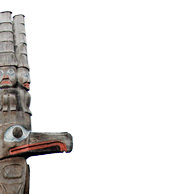 |
|||||||||
 |
|||||||||
 |
|||||||||
19th Century Medical Technology
Description
An archival photograph of Dr. J.S. Helmcken with a talk bubble introduces
the viewer to this activity as well as giving some information about
himself and the medical profession in British Columbia in the 19th
century. Helmcken’s house, one of the oldest in western Canada,
is located on the Thunderbird Park site adjacent to the main Royal
British Columbia Museum building. His medical instruments form part
of the collection of exhibits on display to the public and upon which
this activity is based.
Following the introduction, a photograph of one of these instruments
is shown to the viewer who is challenged to draw the instrument, guess
or predict what the instrument is and make inferences about what it
was used for as well as what the modern day equivalent might be. The
viewer then has an opportunity to look through a medical instrument
catalogue to find the instruments. By clicking on the catalogue picture
and description, the viewer selects the best match. Incorrect matches
send the viewer back to the catalogue to find a closer equivalent.
Correct matches give the option of printing the page (complete with
photograph, viewer drawing and predictions, catalogue picture and description,
and a brief paragraph on the changes in medical technology represented
by this collection at the time), viewing another medical instrument
photograph, or exiting the activity.
There are eight photographs in
the activity and those who complete all eight receive a certificate
of completion that can be printed out.
Typing in your name at the beginning of the activity ensures that your
name is on the printable pages at the end of the activity.
Click HERE to go to activity
TOP of pageLearning Outcomes
Province of British Columbia curriculum samples:
Grade 9 Social Studies
Economy and Technology: Europe and North America from 1500 to 1815
- identify factors that influenced growth and development of industry
Grade 10 Social Studies
Economy and Technology: Canada from 1815 to 1914
- analyse the influence of technological innovations on Canada’s economy from 1815 to 1914
Grade 11 Science and Technology
Module 8: Medicine, health and technology
- describe the interactions of science and technology in the development of modern medical technologies
- relate societal values to the use and emphases of health technologies and technological development
- define the relationship of medicine to science, technology, and society
- describe medical technologies associated with the diagnosis and treatment of specific medical problems
Grade 12 Comparative Civilizations
Foundations of Civilization
- analyze elements and characteristics that contribute to the identity of civilizations, including: structures of power and authority, belief systems incorporated into daily activities, systems of social organization; conflict, war, and conquest; influence of the natural environment, methods of cultural transmission over time.
Suggestions for Use
This activity lends itself well to developing elements of critical thinking including questioning, predicting, inferring, comparing, drawing conclusions, and making reasoned judgments.
Students can be the historians, the detectives, the investigators who observe and predict what the medical instrument artifacts might be. Further investigations or extentions could include finding out what would be used in contemporary times to accomplish the same tasks.
Research one instrument or set of instruments more fully and write a news item, opinion piece, or advertisement in the newspaper writing activity.
BC Ministry of Education suggested instructional strategies for Science and Technology (retrieved from http://www.bced.gov.bc.ca/irp/scitech/st11hu01.htm).
- Have students brainstorm ways in which modern health services incorporate technology. For each technology, have students discuss the links to scientific principles and research. Finally, have students discuss the societal value(s) supporting each technology.
- Have groups of students create reports and presentations on the scientific discovery and research involved in a health technology (one technology per group).
- Invite guest speakers (e.g., a researcher, ethicist, public health nurse, physician) to present and discuss issues related to health technologies.
- Arrange field trips to medical facilities to view health prevention and treatment technologies (e.g., prostheses, blood analysis, dna testing, ultrasound, computerized health technology).
- Arrange for students to interview health-care professionals and to share their findings with the class. These activities can also help students with their personal planning and career exploration.
- Lead a discussion on the development of pharmaceuticals, including the technology involved in synthesizing drugs, the importance of traditional knowledge (ethnobotany), and the possible consequences of rain forest destruction.
Sample Lesson Plan - click HERE for PDF file
